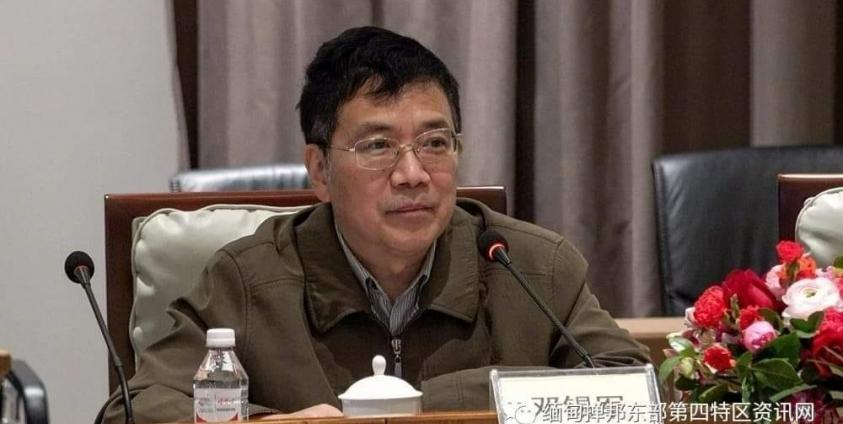China's special envoy to Myanmar, Mr. Deng Xijun, held talks with ethnic armed organizations (EAOs) in Shan State “week that Myanmar analyst U Ye Tun has told the Shan Herald that China is concerned that the United States has been moving towards greater involvement in Myanmar and may support EAOs with arms.”
In the past few days, China's special envoy, Mr. Deng Xijun, met with the Kachin Independence Army (KIA), the United Wa State Army (UWSA), and the National Democratic Alliance Army (NDAA).
U Ye Tun (Hsipaw) considers the possibility of NUG opening of a foreign ministry office NUG in Washington DC, has stoked China’s growing fears , and that this was raised in the meetings with these EAOs, who all share a border with China.
Myanmar's situation is a major policy concern and issue for neighboring China.
China's attitude is that they want Myanmar to follow the democratic path of a government elected by the people. But they don't want American influence.
China is issuing a warning .” said U Ye Tun. Some observers see the flurry of activity by Deng as an effort to counter the Burma (Burma Unified through Rigorous Military Accountability) Act, part of the National Defense Authorization Act (NDAA) that was passed by the United States Congress in December.
Mr. Deng Xijun, who is succeeding China's special envoy, Mr. Sun Guoxiang, had a meeting with the EAOs along the Chinese border last December and also met with the chairman of the Military Council in Naypidaw..
In addition, China's special envoy may also meet with the Myanmar National Democratic Alliance Army (MNDAA), the Shan State Progress Party/Shan State Army (SSPP/SSA) and the Ta'ang (Palaung) National Liberation Army (TNLA) who are active along the Myanmar-China border, ethnic affairs observers said.
Some observers see the flurry of activity by Deng as an effort to counter the Burma (Burma Unified through Rigorous Military Accountability) Act, part of the National Defense Authorization Act (NDAA) that was passed by the United States Congress in December.
The analyst elaborated on Chinese growing fears about an expanding US support for the NUS and EAOs.. "We will know exactly why China's special envoy came to meet them, only when they make an announcement. But we can surmise that China
is worried the US legal support of NUG is afraid the United States will take part in the Myanmar conflict with weapons had their influence in the past because they are worried about that," U Ye Tun (Hsipaw) told the Shan Herald.
Some observers see the flurry of activity by Deng as an effort to counter the Burma (Burma Unified through Rigorous Military Accountability) Act, part of the National Defense Authorization Act (NDAA) that was passed by the United States Congress in December.
The Burma Act authorizes funds and technical assistance for anti-junta forces in Myanmar, including EAOs. The US has pledged to continue to support Myanmar opposition forces inside and outside of Myanmar.”
The Shan Herald reached out to the EAOs several times by phone to get details on the circumstances of the talks they met with China's Special Envoy, but were unable to get in touch.
He also said that China never thinks lightly about the involvement of the United States in the affairs of Myanmar.
China's Special Representative Deng Xijun has served as Special Envoy to ASEAN since 2020 and is currently the successor of Mr. Sun Guoxiang, China's special envoy to Myanmar.
US policy is far more cautious and circumspect than its foreign policy in Ukraine but China is already alarmed by new law
xtra
Deng’s second visit was intended to cement ties with those EAOs as well as to persuade them to reach some form of ceasefire with the regime in Naypyitaw. China is increasingly worried about the instability in Myanmar and the West’s support for the anti-regime opposition led by the shadow National Unity Government (NUG).
Some observers see the flurry of activity by Deng as an effort to counter the Burma (Burma Unified through Rigorous Military Accountability) Act, part of the National Defense Authorization Act (NDAA) that was passed by the United States Congress in December.
The Burma Act authorizes funds and technical assistance for anti-junta forces in Myanmar, including EAOs. The US has pledged to continue to support Myanmar opposition forces inside and outside of Myanmar.
US State Department Counselor Derek Chollet recently told The Irrawaddy in an interview, “Our policy has been rooted in three lines of effort. First was to isolate and punish the junta and to make it harder for the junta to generate revenue and acquire resources and weapons. Second has been to help support the pro-democratic opposition within Myanmar.”
xtra In a recent
op-ed for Nikkei Asia, former US ambassador to Myanmar Scot Marciel called on the US government to provide substantial funding to the NUG and its partners, as envisioned in the Burma Act.
He wrote, “The US also should consider providing equipment to help the resistance improve communications and build on nascent efforts to supply internet access to the public. Washington can also gather military experts to consider ways to help the resistance counter the regime’s air power, mindful of concerns about supplying sophisticated anti-aircraft systems.”
He urged the Biden administration







